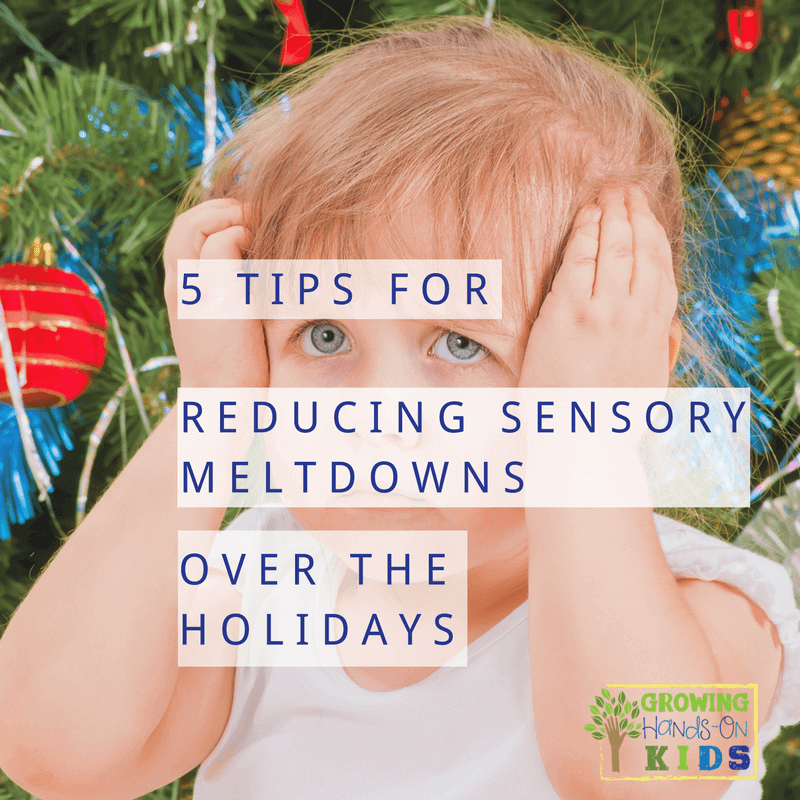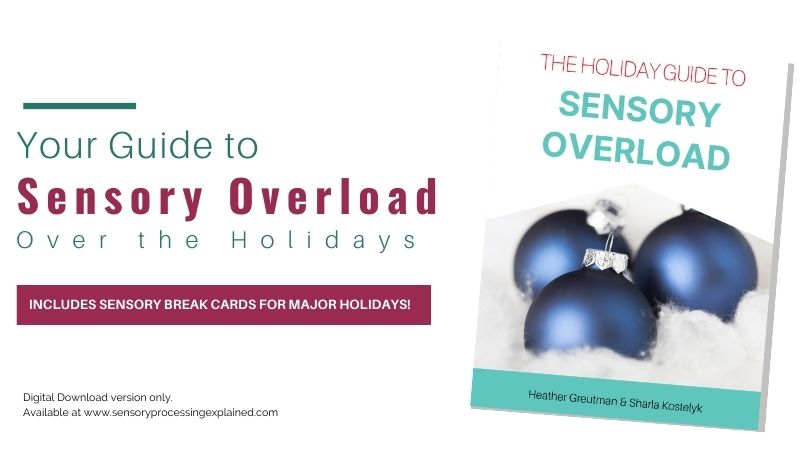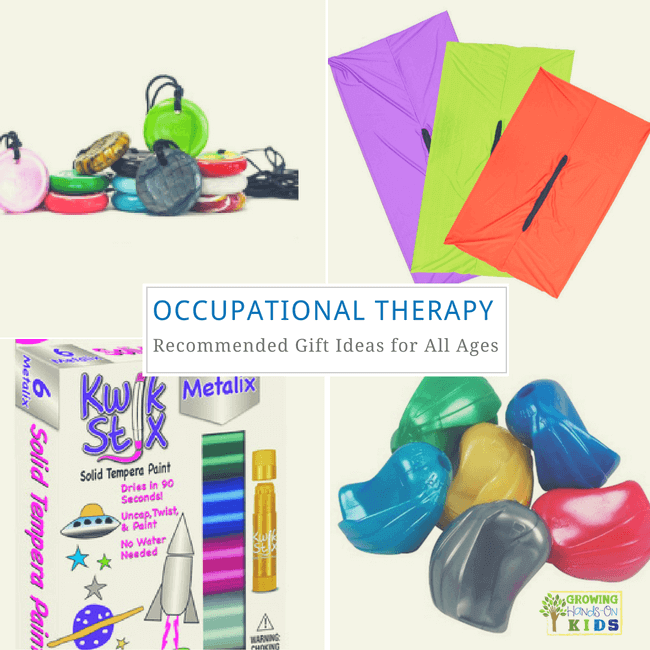5 Tips to Reduce Sensory Meltdowns During the Holidays
Affiliate and Referral links are used below to promote products I love and recommend. I receive a commission on any purchases made through these links. Please see my disclosure policy for more details. As an Amazon Associate, I earn from qualifying purchases.
The holiday season can be a stressful time. If you are a parent of a child with sensory challenges, those issues can intensify over this time of year. Here are some tips to reduce sensory meltdowns during the holidays.
I reached out to some of my blogging friends and fellow moms who also happen to parent children with sensory challenges.
Even if you follow all these tips, that does not mean your child won't have a sensory meltdown over the holidays. However, I know many of these strategies will help to manage sensory meltdowns and give you tools to use if your child does have one.
Tip #1 – Use a Sensory Calm Down Bag
Elizabeth suggested creating a sensory calm-down bag and bringing it along. If there are items that help to soothe your child when they are overwhelmed then place them into your calm-down bag and bring them along just in case. Some examples of items you can bring along include; noise-canceling headphones, a pressure vest, a squishy/fidget toy, a chewy tube, an iPod, headphones with calming music, or even a rice pouch that has been infused with essential oils.
Your child will appreciate having their comforting items within reach when they need them most. Children with sensory difficulties often cannot calm themselves on their own. By having these items close by, you’re prepared to help your child cope with whatever this holiday season brings.
Suggested: Fidget Toolkit for Kids, Anti-Anxiety Toolkit for Kids from The Chaos And The Clutter.
Tip #2 – Leave Room for Quiet
Jennifer says “We’re dealing with holiday sensory meltdowns again. They’ve been particularly bad this year, and we’ve found one thing that works better than any other: we’re going back to the beginning. The brushing, joint compressions, plenty of time for sensory play and activities she finds relaxing, providing deep pressure with a weighted blanket or other means, and all the other things we used to do when she first began therapy and we first realized that SPD is why some of the meltdowns were occurring—we’re doing them all again and always giving her the option of having a timeout during any gatherings where she can be calm and quiet, away from the bustle of the event. That’s what we’re doing this year, and after only a week of really being diligent, it’s working.”
Tip #3 – Pre-Activity Preparation
Rebekah says: “Our 9-year-old struggles with sensory issues and we’ve learned a lot as we try to successfully navigate through the holidays as a family. What has worked best for us is pre-activity preparation. We work to find out as much as we can about any activity we choose to participate in, to prepare him ahead of time. For example, we might look up a Christmas light display online, read about it, and watch any clips they show online. We also drive by places several days before we plan to visit so that it’s not a “brand new” outing for him. If we have time, we’ll stop and walk around to explore for a bit (look for lights or sounds that may trigger him).
When it’s time for the whole family to participate, he feels as though he’s already had some success at that location or activity, and that helps keep him feeling calm and less likely to have a sensory meltdown.”
Tip #4 – Plan Ahead and Stick to Routine
Sharla from The Chaos And The Clutter Says: “Four of our seven kids have SPD (sensory processing disorder) and the holidays can be a challenge. Over the years, we've figured out that a few small adjustments can make things run much more smoothly. A lot of the things that we do to get through the holidays with our kids who suffer from anxiety also apply to kids with sensory issues.
Taking sensory balls, play dough, a favorite stuffed animal, or a weighted blanket with you when you go out to holiday parties or family gatherings can be very helpful. Take time before going out to talk about some of the sensory challenges (loud noise, bright or blinking lights, having to sit still, etc.) that may be present, and brainstorm coping strategies together. I also advise sticking as closely to the routine as possible. It is possible for both you and your child to enjoy the holidays!”
Tip #5 – Find a Quiet Room While Out and About
If you know you are going to be at a friend or family member's house for a holiday party or overnight, ask that person or hostess ahead of time if there is a room that your child could use as a quiet room. Talk to your child ahead of time and let them know that if they start to feel anxious or get overwhelmed by noise, sight, smell, etc they can retreat to this room to gain their composure or to relax.
You will also be keeping an eye out for signs of sensory overload and also take them to this room if they seem to be escalating. It will take them out of the stressful situation and hopefully provide a safe and calming environment for them, while still allowing your family to take part in the holiday festivities.
BONUS TIP – Say No!
With the holidays comes added pressure and expectations. I know I definitely struggle with learning to say “NO” to something, even if I know our schedule is already jam-packed.
Saying “NO” when you know your schedule is already full or you know an activity is just not right for your child and family is important.
The holidays can be a minefield for a child with sensory challenges. The Holiday Guide to Sensory Overload offers practical tips and helpful information to make the holidays less stressful for everyone.
Also includes printable sensory break cards for the holidays of Christmas, Hanukkah, Diwali, and Kwanzaa!
I hope you are able to find some peace and quiet this holiday season.
You May Also Like:

Heather Greutman, COTA
Heather Greutman is a Certified Occupational Therapy Assistant with experience in school-based OT services for preschool through high school. She uses her background to share child development tips, tools, and strategies for parents, educators, and therapists. She is the author of many ebooks including The Basics of Fine Motor Skills, and Basics of Pre-Writing Skills, and co-author of Sensory Processing Explained: A Handbook for Parents and Educators.





These are all good tips and even adults may benefit from them. Sometimes we forget that one little word “No” which might alleviate many anxieties for both parent and child.
Yes, totally agree!
These are amazing strategies that are very practical and very effective! Thanks for sharing!
This are Great tips even for children without any underlying issues. I’m 30 and I have breakdowns from to much going on during the holiday’s.
Thank you for linking up! There are great tips!
Thank you!!
Fantastic tips! Sharing with my mom-friends!
Thanks Kristen!